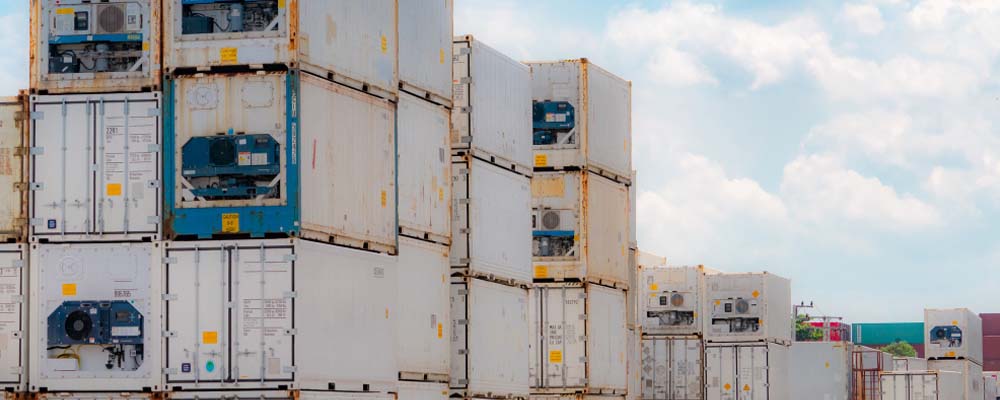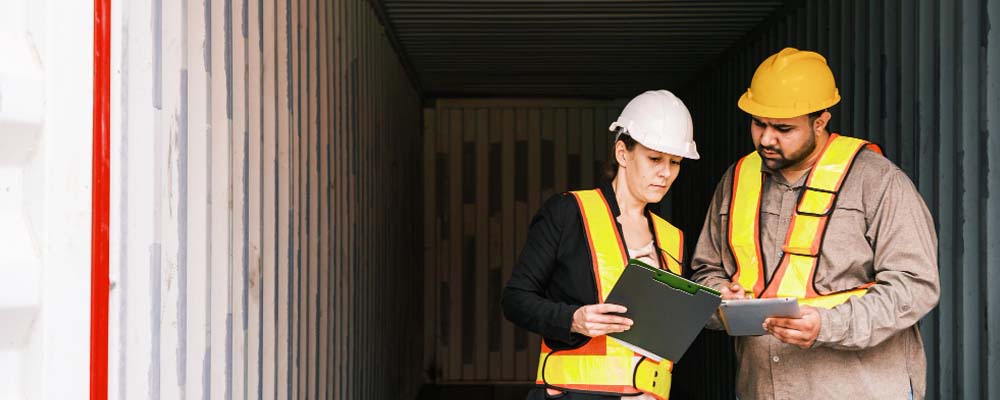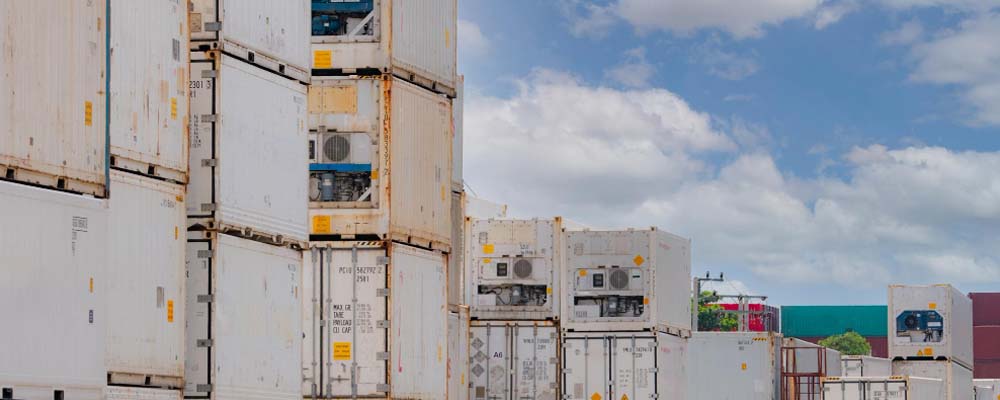
In the bustling world of logistics and freight forwarding, maintaining the integrity of perishable goods during transport is paramount. Enter reefer containers—a game-changer in the shipping industry. Whether you’re a freight forwarder, logistics provider, or a manufacturer, understanding reefer containers can significantly impact your business operations and bottom line. Today, we’ll take a deep dive into everything you need to know about reefer containers, from their essential features to practical tips for choosing the right provider.
Understanding Reefer Containers
What is a Reefer Container?
A reefer container, short for “refrigerated container,” is a specialized container used to transport temperature-sensitive cargo. Unlike standard shipping containers, reefers are equipped with built-in refrigeration units to keep the interior climate controlled and consistent.
What is a Reefer Shipping Container Used For?
Reefer containers are vital for transporting perishable goods such as fruits, vegetables, meat, seafood, dairy products, pharmaceuticals, and even certain chemicals. Their ability to maintain specific temperature ranges makes them indispensable for global trade involving temperature-sensitive products.
Types of Reefer Containers
Standard Reefer Containers
Standard reefers are the most common type, generally available in 20-foot and 40-foot sizes. These containers offer a wide temperature range and are suited for most perishable goods.
Controlled Atmosphere Reefer Containers
Controlled Atmosphere (CA) reefers provide an advanced level of control over the internal environment, including oxygen and carbon dioxide levels. This feature extends the shelf life of certain products like fresh produce.
Dual-Temperature Reefer Containers
Dual-temperature reefers have separate compartments that can be set to different temperatures. This versatility allows for the simultaneous transport of goods requiring varied temperature settings.
What are the Dimensions of a Reefer Container?
Reefer containers come in various sizes to accommodate different shipping needs. The most common dimensions for standard reefer containers include:
20-foot Reefer Container
- External dimensions: 20 ft long x 8 ft wide x 8.5 ft high
- Internal dimensions: Approximately 19.4 ft long x 7.7 ft wide x 7.5 ft high
- Capacity: Around 28 cubic meters (1,000 cubic feet)
40-foot Reefer Container
- External dimensions: 40 ft long x 8 ft wide x 8.5 ft high
- Internal dimensions: Approximately 39.5 ft long x 7.7 ft wide x 7.5 ft high
- Capacity: Around 67 cubic meters (2,400 cubic feet)
High-Cube Reefer Container
- External dimensions: 40 ft long x 8 ft wide x 9.5 ft high
- Internal dimensions: Approximately 39.5 ft long x 7.7 ft wide x 8.5 ft high
- Capacity: Similar to standard reefer containers but offers additional height for loading.
These dimensions allow reefer containers to effectively transport various perishable goods while adhering to industry standards for temperature control and ventilation.
 How Much Do Reefer Containers Cost with Each Dimension?
How Much Do Reefer Containers Cost with Each Dimension?
20-foot Reefer Container Cost
The cost of a new 20-foot reefer container generally ranges from $10,000 to $15,000, depending on the brand and features. Used models are more affordable, ranging from $5,000 to $8,000.
40-foot Reefer Container Cost
A new 40-foot reefer container typically costs between $15,000 and $25,000. Used containers can be found for prices between $8,000 and $12,000.
High-Cube Reefer Container Cost
High-cube reefers are slightly more expensive. A new 20-foot high-cube container costs around $12,000 to $18,000, while a 40-foot high-cube model can range from $20,000 to $30,000.
Benefits of Using Reefer Containers
Temperature Control
Reefer containers provide precise temperature control, ensuring that goods remain fresh and safe during transport. This feature is crucial for pharmaceuticals and perishable food items.
Versatility
The adaptability of reefer containers makes them suitable for various industries, from food and beverages to pharmaceuticals and chemicals. Their ability to maintain a controlled environment for different products is unmatched.
Reduce Waste
By maintaining optimal conditions, reefer containers help reduce spoilage and waste. This not only saves money but also minimizes the environmental impact of discarded goods.
Key Components of Reefer Containers
Refrigeration Unit
The refrigeration unit serves as the core component of a reefer container. It ensures that the internal temperature remains within the set range, regardless of external conditions.
Insulation
High-quality insulation helps maintain the desired temperature by minimizing heat exchange between the container’s interior and the outside environment.
Monitoring Systems
Modern reefers come equipped with sophisticated monitoring systems that track temperature, humidity, and other critical parameters. These systems can alert operators to any issues in real time.
 Best Practices for Using Reefer Containers
Best Practices for Using Reefer Containers
Pre-Cooling
Always pre-cool the reefer container before loading to ensure it reaches the desired temperature. This practice helps maintain the integrity of the goods throughout the shipping process.
Proper Loading
Load the container wisely to allow adequate air circulation around the cargo. This practice ensures that all parts of the shipment are uniformly cooled.
Regular Maintenance
Keep the refrigeration unit and monitoring systems in top condition through regular maintenance. Timely servicing can prevent unexpected breakdowns and ensure smooth operations.
Industries Benefiting from Reefer Containers
Food and Beverage
The food and beverage industry relies heavily on reefer containers to transport fresh produce, meat, seafood, and dairy products. The ability to maintain specific temperatures ensures product quality and safety.
Pharmaceuticals
Pharmaceutical companies use reefer containers to transport temperature-sensitive drugs and vaccines. Consistent temperature control is crucial for maintaining the efficacy of these products.
Chemicals
Certain chemicals require specific storage conditions to remain stable. Reefer containers offer the precise environment needed for the safe transportation of these materials.
Challenges in Using Reefer Containers
High Initial Costs
The initial investment for purchasing or leasing reefer containers is high. Nevertheless, the long-term advantages and cost savings typically surpass the initial investment.
Maintenance Requirements
Regular maintenance is essential for reefer containers to maintain optimal performance. Any lapse in upkeep can lead to equipment failure and product spoilage.
Complex Regulations
Transporting temperature-sensitive goods involves adhering to strict regulations. Navigating these can be challenging but is essential for ensuring compliance and avoiding penalties.
Regulatory Considerations for Reefer Containers
International Standards
Reefer containers must comply with international standards such as ISO 1496/2 and ATP (Agreement on the International Carriage of Perishable Foodstuffs). These standards ensure containers’ suitability for transporting perishable goods.
FDA Guidelines
In the United States, the FDA regulates the transportation of food and pharmaceuticals. Ensuring compliance with these guidelines is crucial for businesses operating in these sectors.
Custom Regulations
Each country has its customs regulations for importing and exporting goods. Familiarize yourself with these to ensure smooth cross-border shipping.
Tips for Choosing the Right Reefer Container Provider
Reputation
Select a provider known for their reliability and quality. Review feedback and testimonials from other businesses in your industry to ensure their reputation.
Range of Services
Select a provider that offers a comprehensive range of services, including container leasing, maintenance, and real-time monitoring.
Customer Support
Excellent customer support is essential, especially when dealing with temperature-sensitive shipments. Ensure that your provider offers 24/7 support to address any issues promptly.
 Conclusion
Conclusion
Reefer containers are indispensable for businesses involved in transporting perishable goods. Understanding their features, benefits, and best practices for use can significantly enhance your shipping operations. By choosing the right provider and staying compliant with regulations, you can ensure the safe and efficient transportation of your temperature-sensitive products. Ready to take the next step? Explore our comprehensive range of reefer containers and elevate your shipping game today.




 How Much Do Reefer Containers Cost with Each Dimension?
How Much Do Reefer Containers Cost with Each Dimension? Best Practices for Using Reefer Containers
Best Practices for Using Reefer Containers Conclusion
Conclusion



